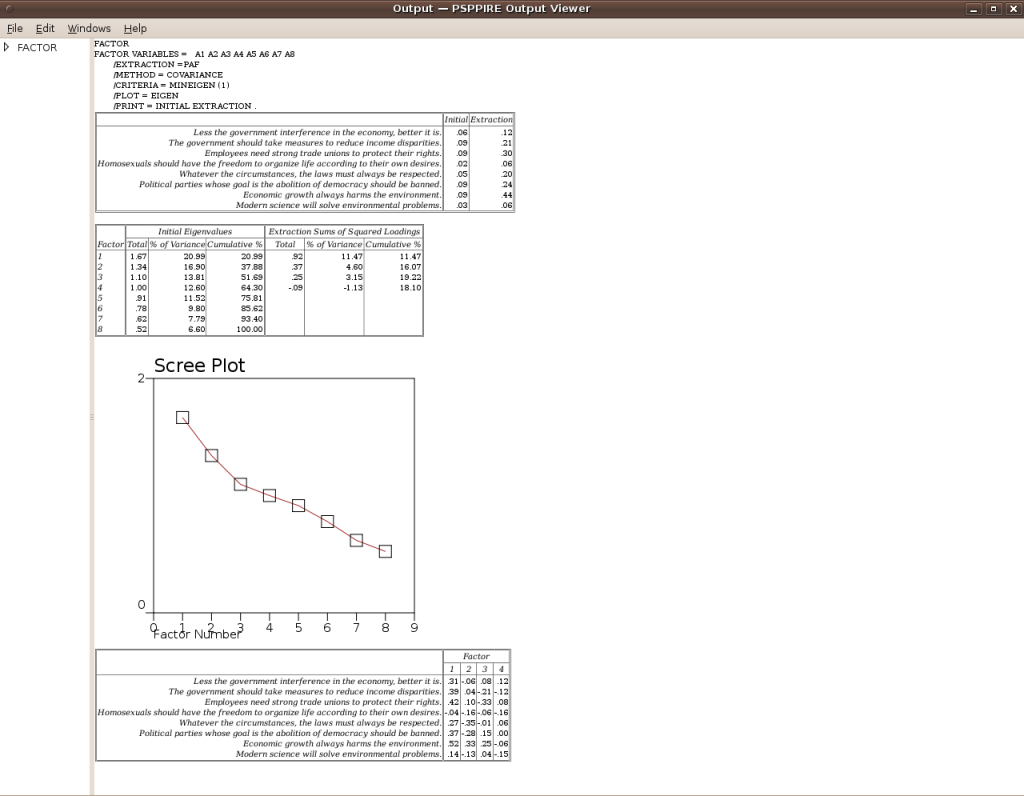
2017), moreover, if the consumer perceives that the AISD is minimum(or feel the self-congruence), the emotional brand attachment and brand loyalty will increase (Huber et al.
Pspp principal component analysis software#
2021), similarly, the discrepancy between ideal and actual body image has been found to be related to social network software usage (Ahadzadeh et al. Self-discrepancy theory assumes that the discrepancy between actual and ideal self can produce specific emotions (Higgins 1987), such a theoretical perspective has drawn more attention in recent research, for instance, the actual-ideal self-discrepancy (AISD) increases the intention to purchase counterfeit luxury brands (Shan et al. Following this stream, physical self refers to the subjective evaluation of one's physical condition and appearance (Fox and Corbin 1989 Marsh and Redmayne 1994 Shavelson et al. Self is both multifaceted and hierarchical, for instance, the global self can be divided into social self, emotional self and physical self (Marsh and Shavelson 1985). Palabras clave: autoconcepto físico, formación inicial del profesorado, metodología activa, modelos pedagógicos, cuestionario CAF.

Los resultados obtenidos indican que metodologías activas, como el aprendizaje cooperativo, pueden repercutir de manera positiva en el autoconcepto físico de futuros y futuras docentes de Educación Física, pero teniendo en cuenta el tamaño de la muestra y la no presencia de un grupo control, se aconseja prudencia a la hora de establecer relaciones causa-efecto.

Además, y en consonancia con la literatura científica existente, se encuentran diferencias estadísticamente significativas dependiendo del género, siendo las chicas las que consiguieron puntuaciones más bajas, tanto pre-como post-intervención. El análisis de los datos obtenidos muestra que después de la intervención mejoraron las puntuaciones en todas las escalas del autoconcepto físico. Para valorar el autoconcepto físico de los participantes se les administró el Cuestionario de Autoconcepto Físico (CAF) antes y después de la intervención. Participaron de manera voluntaria 53 estudiantes (41 chicos y 12 chicas con un promedio de edad de 20.9 años). Se utilizó un diseño cuasi-experimental y longitudinal donde se llevó a cabo una intervención durante cuatro meses (46 sesiones de hora y media) en el 3ºcurso del Grado de Magisterio Educación Primaria (mención de Educación Física). Our findings are discussed and related to previous studies.Įl objetivo principal de esta investigación fue analizar los efectos de una intervención basada en el aprendizaje cooperativo sobre el autoconcepto físico de futuros y futuras docentes de Educación Física. There was no change in any of the assessed variables for women in the control group.Ĭonclusion: The present study provides new insights on the role of physical exercise in the understudied population of women with domestic violence.

On the other hand, only women from the Physical Exercise group reported significant gains in Physical Condition and Body Attractiveness. Global Self-Esteem significantly improved in the two intervention groups, with a trend for better improvement in women who exercised compared to those who took part in support group meetings, Cohen’s d = 0.68, 95% confidence interval. Results: Mixed-design ANOVAs revealed significant Group by Time interactions for Global Self-Esteem, Physical Condition, and Body Attractiveness. The French version of the Physical Self-Perception Profile (ISP-25) was administered to all participants pre- and post-study. Participants were randomly and equally assigned to two intervention (physical exercise, counseling/support group therapy) and one control (no intervention) groups. Method: Thirty-six domestic violence victims (mean age: 33.4 ± 3.5 yrs-old) were enrolled in this study. Purpose: The purpose of the present brief report was to examine the effects of a 6-week long physical exercise program on global self-esteem and physical self-perceptions among women who faced lockdown-related domestic violence.


 0 kommentar(er)
0 kommentar(er)
